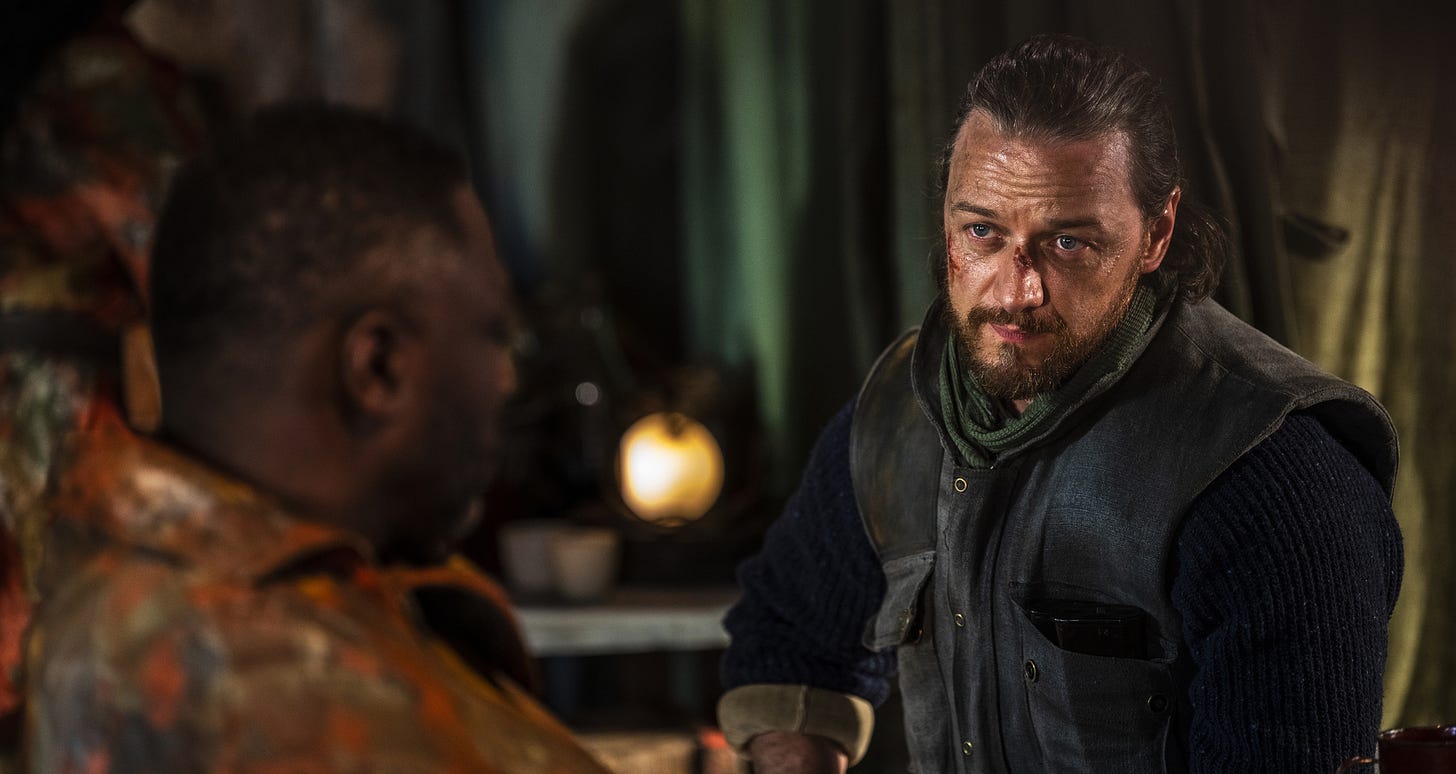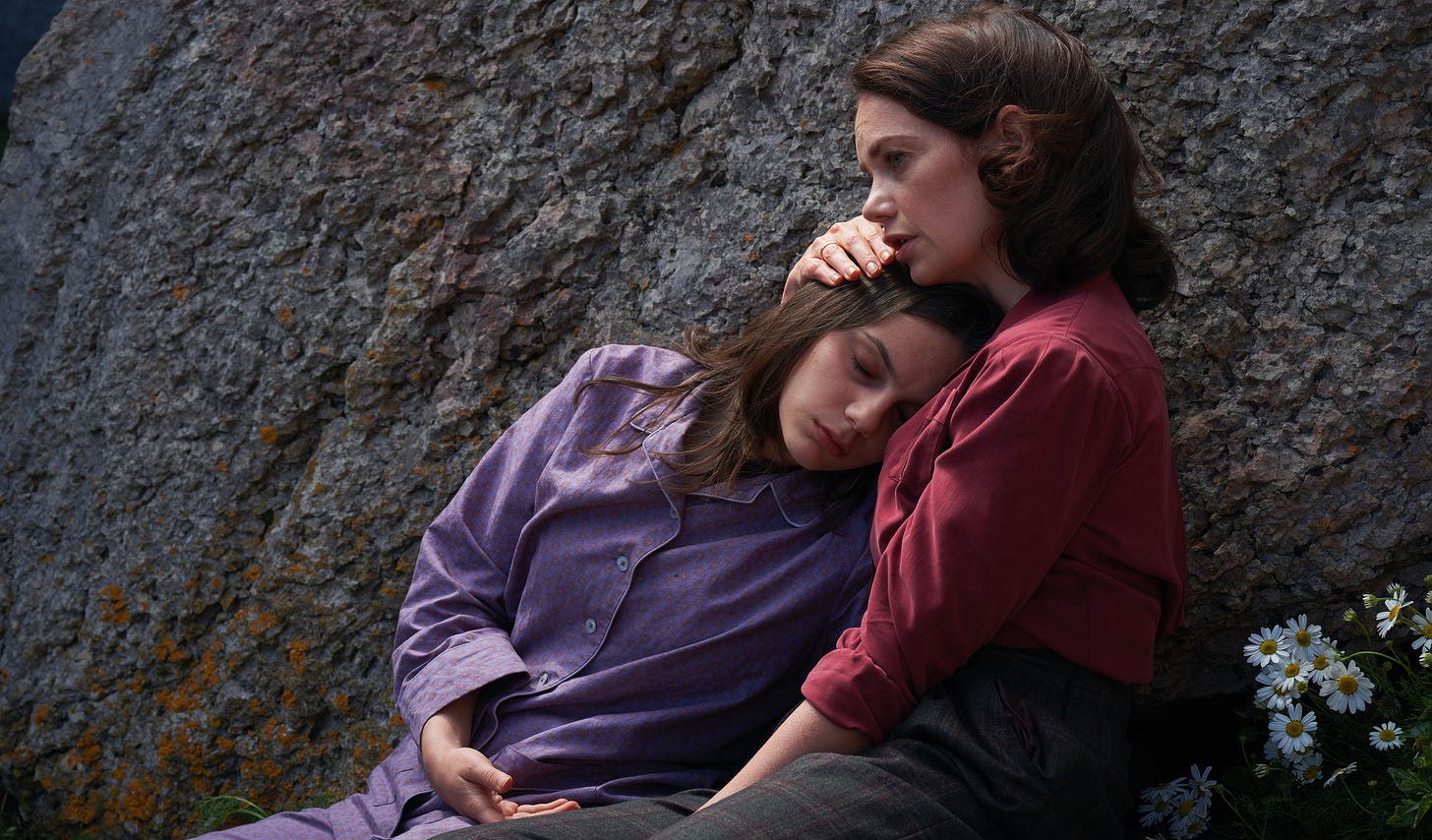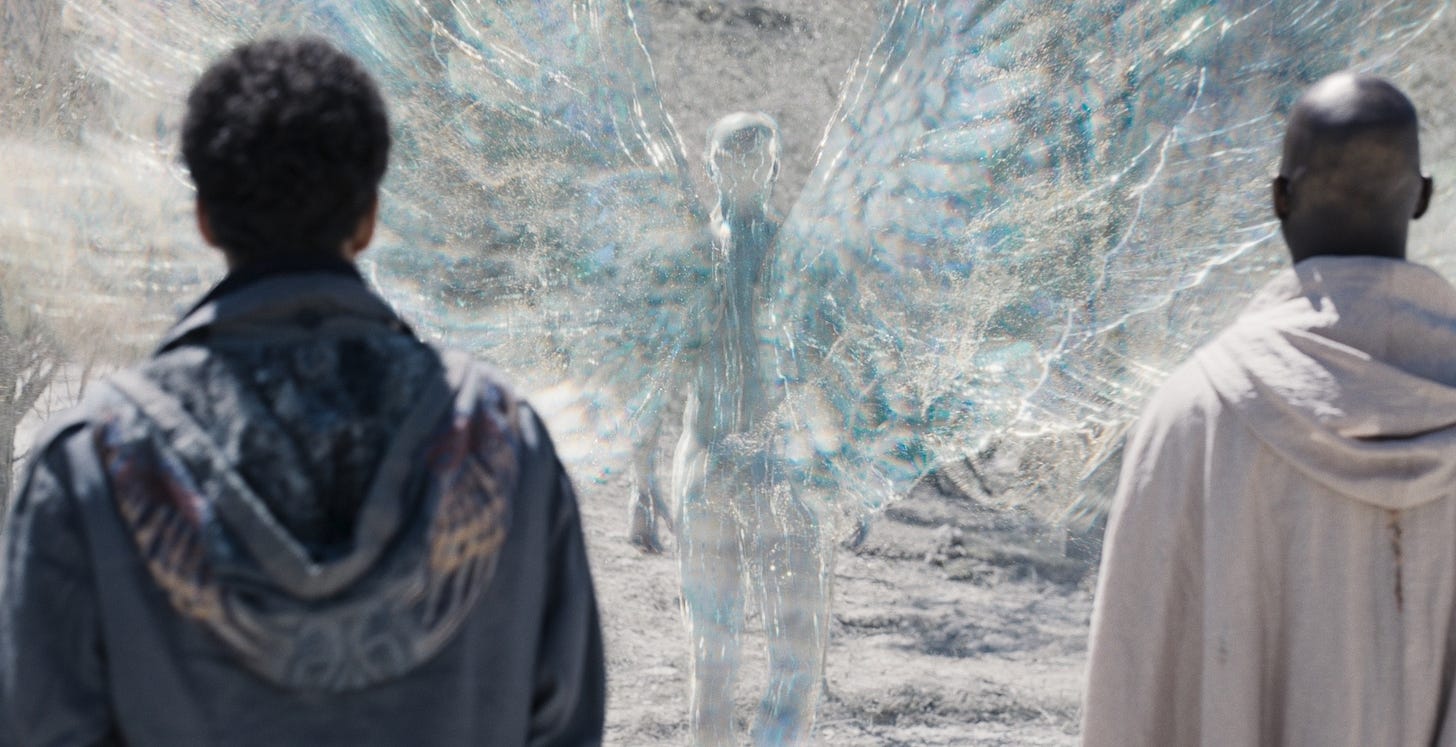Review: His Dark Materials, "The Enchanted Sleeper" and "The Break" | Season 3, Episodes 1 and 2
HBO and BBC's fantasy adaptation lays the groundwork for its epic conclusion, for better or worse
Welcome to Episodic Medium’s coverage of the third and final season of the HBO/BBC adaptation of His Dark Materials. I’m thrilled to be completing my coverage of the show that I started back in 2019 at my former critical home The A.V. Club—the eight-episode season will debut with two episodes a week on HBO, while the entire season will debut on BBC iPlayer on December 18. We’ll be following the HBO schedule in sending out reviews, but please let me know if you’re reading from the U.K. as I decide how to handle the publication of a finale review over the holidays. As always, the first review of each season here at Episodic Medium is free, but subsequent reviews and our comment sections are for paid subscribers. We appreciate your support of creating a sustainable space for weekly reviews of your favorite shows, and hope you’ll join us for $5 a month.
It’s been two years since His Dark Materials aired its second season, and you feel it as soon as the third season begins. Some of this has to do with the unavoidable reality that Dafne Keen and Amir Wilson have grown significantly since they last filmed scenes for the show in 2019 (this season began filming in 2021). But on a simpler level, it’s hard for any series to generate momentum after so long off the air, something that we’ve been reflecting on for a number of shows (Barry, Atlanta, etc.) this year.
Yet the reality of Philip Pullman’s novels makes this a particularly awkward point to re-enter the story after such a long time away. The first two seasons were about Lyra and Will on a collision course with each other and their destinies, and in last season’s finale Will’s father and Lee Scoresby sacrificed their lives to ensure they would live to see what the future holds for them. But the tension in His Dark Materials comes from the fact that this story both is and isn’t so much bigger than it seems. Lyra and Will’s story is, to the Magisterium, about the very essence of sin, and it’s interweaved with Asriel’s war on The Authority—God, it’s God—himself. And yet this is also about something very simple: two people, coming of age, faced with the challenge of facing down the point where your young self crystallizes into something both familiar and frightening at the same time. As much as Lyra and Will’s actions are an important part in a larger story, the core thesis of the novels is that none of that matters as much as what they discover about themselves and each other through this journey.
This is all to say that these opening two episodes of the third season—adapting the events of The Amber Spyglass—are trapped a bit by the reality of Lyra’s story at this juncture. Lyra spends these episodes under the care of her mother, who is drugging her to keep her captive and protected from the Magisterium. She dreams of Roger in a foggy wasteland, haunted by her past, and struggles to keep a grip on Pantalaimon and her surroundings. As the episode progresses, the story converges on her location: the Magisterium coming to kill her, Asriel coming to procure the “weapon” (the knife) he’s heard can kill gods, and Will simply fighting to save his friend from a terrible fate. In other words, the story we naturally care most about—and which objectively matters most—basically gets paused while the stories around it develop, building up only to be stymied again when Will and Lyra escape through the window, with Asriel’s spy hot on their heels.
I imagine that a good portion of the Asriel material in these episodes was originally intended for a standalone episode that was meant to be a part of last season before the pandemic scuttled attempts to work with McAvoy’s other commitments. And overall, my take is that it would have worked better there as a buildup to his final rallying cry scene, because I found them to be pretty dull on the whole. As much as it’s important for the show to lay out its core themes regarding organized religion and the very notion of “authority” therein, spending so much time on Asriel recruiting Commander Ogunwe (Lost’s Adewale Akinnuoye-Agbaje) and torturing angels to get information feels like we’re focusing on the wrong parts of this story. There’s some necessary exposition here—Metatron as the Authority’s Regent, war amongst the angels, etc.—but that’s exactly why it would have been better to have split some of that in the episode last season, able to tighten the focus here to the parts of the story that matter most.
It’s a frustrating thing, really, because as good as Ruth Wilson and McAvoy are, I’m not convinced expanding their roles has actually made His Dark Materials a better story. I understand Jack Thorne’s instincts in creating more story outside of Lyra and Will’s core narrative—although the books aren’t a rigid point-of-view situation, an adaptation creates opportunities to diverge further, giving us scenes like Lee and Coulter’s tete-a-tete that do offer new shades to characters that are overall well-drawn. But when we get such a concentrated dose of the adult side of these stories, as we do with Lyra indisposed, the story feels trapped between the show’s thematic ambition and limited resources. After the rather stunning realization of Citigazze last season, the environments this year are comparatively stark: Coulter’s stone chapel is a fine visual, but Ogunwe’s war never registers as real, and Asriel’s base camp is visually indistinct to the point I didn’t even register a significant change in location. I’m glad they spend some money on Iorek rampaging through some Magisterium soldiers, but the low budget situation that Mary Malone walked into with the two orphan girls underlined how muddled the production design is on the series as a whole.
It’s why I’m a bit surprised the show is dragging its feet on getting Mary to some semblance of her actual purpose in the narrative: having her wander aimlessly into a corner of Ogunwe’s story about “the temple” and brainwashed young women was just reinforcing the exposition in Asriel’s story, which seems like a waste of time even if you’re not on your couch chanting “Mulefa! Mulefa!” I suppose it’s an inherent pacing challenge of The Amber Spyglass that the entire rest of the story is approaching its climax while Mary is meandering into other worlds, but that’s why you need to accelerate getting her to a more meaningful turning point, especially given that after these episodes we’re a quarter of the way through the season.
I have to admit that I have a lot of skepticism heading into this final season. It’s not that I’m anxious about how the show will transition into the religious dimensions of this climax after kind of soft-shoeing their approach all season—Asriel’s story here is pretty explicit. It’s more that I look at the choices the show has made in expanding out the story, and wonder if it will amount to much of anything in the end. We’ve spent more time at the Magisterium, but I have no investment in MacPhail, and the buildup for Father Gomez was pretty much a waste if Coulter was just going to ring his bell like that. And while we’re getting more time with Asriel’s war council and the buildup to his conflict, there’s not enough work going into the introduction of the Gallivespians—the little flying people, if you’re not following—for the story as a whole to be enriched.
And this is where my skepticism lies: I’m fairly certain that His Dark Materials is in position to executive significant parts of this story well, but I’m not convinced anything they’ve done in or around that core story will end up amounting to anything. While Ruta Skadi shows up, the witches are otherwise fully relegated to the background, despite the—deeply inconsistent—work the second season did in trying to build more story around them. While the two-year gap between seasons is no doubt contributing to the feeling that everything the show did previously has kind of faded from memory, I feel confident saying the show has done a very bad job at accumulating narrative momentum outside of Will and Lyra beyond that.
Will’s story is the only piece that really fully works here. We see his perseverance in searching for Lyra, his loyalty remaining with her even as the angels—Baruch and Balthamos, queer icons—arrive with a request from Asriel that affirms his father’s dying words. He parlays with Coulter and explores the idea of his strength, and returns to outwit her, foiled only by her evocation of his loyalty to the mother he left behind. The breaking of the knife mirrors Asriel’s struggle to activate the intention machine, as both characters wrestle with the idea of their true motivations, and the love—that sinful thing—that clouds their judgment and purpose in ways they’ve been trained to ignore by society. But whereas Asriel’s story is burdened with exposition and the war of it all, Will’s is pure and true, and all of the show’s momentum rests with him helping Lyra escape into yet another window, haunted by their respective pasts as they work to find a path forward together.
As such, I’m hopeful that with this exposition out of the way and the board more clearly set, His Dark Materials can shift its focus to the core of the story again, and let the path forward for them and those around them cohere into something worthy of the source material and the cast’s potential. But it’s a bit alarming to me that those involved felt like this was the right two hours to really bring the show into its final phases, and there’s a single episode version of these same events that I’d feel more confident in than what we got here.
Stray observations
Welcome to Episodic Medium’s His Dark Materials coverage! I truly don’t know who’s still watching the show, and if there’s a huge market for these reviews, but there was no way I was letting my reviews go unfinished, so I hope you’ll join me for this final journey.
I’m pretty sure that not formally writing some type of time jump into the script despite Wilson and Keene aging so dramatically qualifies as gaslighting? Coulter talks about how much Will has grown since she first knew him, but despite including a scene of Will discovering Lyra’s disappearance that looked plucked from last season, it doesn’t feel like much time has passed in the other stories, despite the montage of him searching through worlds for Lyra.
Opening with an epic overview of the situation with the angels makes sense, maybe, but to me it overplays how important the “war” is to the actual story, and affirms the notion of Lyra’s importance being tied to the “Eve” mythos in a way that doesn’t actually match the story for me. It’s a beautiful-enough sequence, but its utility is questionable.
That said, do we think there’s a fervently religious viewer out there who has been watching along failing to register the actual themes of the story who jumped out of their seat at the direct evocation of heaven?
I rewatched last season’s finale before starting this, and it was hard not to observe how much Lee’s death gets lost in the shuffle here: while John Parry’s sacrifice resonates through Will, literally no one knows what Lee did to protect Lyra with Serafina sitting this one out. There was no “Previously On” attached to the screener, but I’m curious which pieces of the story get a mention.
“When is Lyra not in danger?”—okay, so this is meant to demonstrate that Asriel continues to ignore his daughter’s well-being in his single-minded quest, but I mean…he’s not wrong.
Red Panda Pan Watch: With Lyra asleep, Pan never changes form, which is indeed a huge disappointment for the return of Red Panda Pan Watch. However, the minimal amount of Pan also helps ease us back into the character without being overwhelmed by the “Wait, isn’t that Nick Nelson?” in our post-Heartstopper moment, although both Asriel and Coulter’s daemons get more screentime (I particularly liked Asriel’s riding in the little cart).
Ruth Wilson continues to bring Coulter to life in dynamic ways, but my favorite was her low energy “That’s me” hands-up gesture when Father Gomez finds her on the beach with her daemon-inflicted wound to try to lie and say Lyra attacked her. Cracked me up.
The explicit queerness of Baruch and Balthamos goes in the column of “Would this have been allowed if The Golden Compass had been a hit and they’d continued with the film franchise fifteen years ago?” (My vote is “they were roommates”).
Book Changes: I don’t yet know if the audience for this reviews and the subsequent discussions will be predominantly readers or non-readers, or even if that audience will migrate here from my reviews at The A.V. Club. As such, I am definitely blurring the lines between the two, without trying to entirely protect from spoilers but without explicitly discussing those details. My current plan is to just briefly discuss some book details that stuck out to me here at the end of the review, again avoiding explicit spoilers for future developments.
In the books, Will runs into Iorek in the midst of a global warming incident that ties the issues surrounding dust to our own world’s calamities, whereas here he’s terrorizing a port because they’ve imprisoned one of his fellow bears. I’m curious if we eventually get some version of the former story, given how prescient it feels all these years after Pullman wrote it.
Sending Father Gomez after Marisa makes sense, but in the books he’s sent after Mary instead, and thus his threat looms longer in the story. I’m interested in how they create tension with her side of this tale in his absence.
Okay, this one is definitely for readers: it is honestly rude for the show to put Mulefa World into the opening credits like this and not event get close to traveling there in these first two episodes. The gall.








Bit late catching up with the premiere, but what you say about this story getting a bit big at the expense of the Lyra and Will of it all is really striking, because that's kind of been the vibe I've gotten throughout the whole show. In fairness, it's been ages since I've seen season 1 or 2, and also ages since I last read the books (much as I loved them), so maybe I'm not remembering right. But the books always struck me as very grounded in Lyra and Will's story, and the larger war, interesting as it is, never overshadows them. Here, it feels like they get a bit lost in the noise.
I've also felt like Show Lyra has lacked that feeling of agency, and been more buffeted around by events, versus Book Lyra who's such a dynamic, agile character (not called Silvertongue for nothing) and who drove the story as much as she reacted to it. Again, maybe my hazy memory's unfairly inflating Book Lyra and discounting Show Lyra, so curious if others feel similarly.
Am also a big sucker for the big epic stuff and mythology, so the expanded Asriel stuff should feel more exciting than it is - but it doesn't feel very earned here, and very likely the Asriel stuff they had to cut from last season's a big reason why.
That said, if they give us Mulefa World ASAP that'll go a long way, just saying!
I was behind on getting to these episodes, and I still haven't watched the two that dropped this week. But at least that lets me reflect and engage here on the same level of your review, Myles.
Overall, I agree with most of what you've written, although I'll add that my own personal bugbear of this adaptation, the lack of consistency in depicting dæmons on-screen, continues unabated. (You can't just give a quick shot of one and then shove them up a sleeve! They should be visible and vocal throughout any scene of anyone from Lyra's world. Asriel even directly identifies his dæmon as a manifestation of his soul here, but the episodes do nothing to extend that framing to Father Gomez, the deaf girl, etc. I know it's a budget issue, but come on: if you're adapting HDM, that's something you need to build into your budget in the first place. The story doesn't work without Lyra's world teeming with dæmons, and it's a weakness even as we spend more and more time away from there.)
I also think I'm coming into this final season a bit cooler on it than you are, since I haven't really liked the show much to begin with. Season 1 rushed to introduce Will but found nothing substantial for him to do before the finale, and season 2, while improved by the two child leads actually intersecting, had all those interminable check-in scenes with the witches and the Magisterium that likewise went nowhere interesting. So even though I don't feel 3x1 and 3x2 are telling the best possible version of The Amber Spyglass, they actually surpassed my expectations and have me hopeful that I'll find this season to be another improvement over the last.